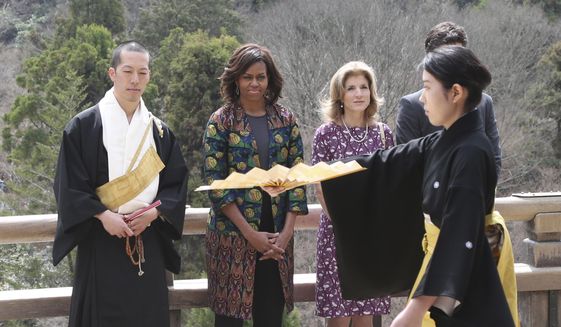By Guy Taylor - The Washington Times - Tuesday, August 25, 2015
The State Department’s internal watchdog leveled biting criticism at the management style of U.S. Ambassador to Japan Caroline Kennedy in a new audit on Tuesday, citing “confusion among staff” and “major management challenges” in key offices at the Tokyo embassy.
And in an echo of the email woes plaguing former Secretary of State and 2016 Democratic presidential candidate Hillary Rodham Clinton, the inspection by the department’s Office of Inspector General (OIG) specifically faulted Ms. Kennedy, the daughter of President John F. Kennedy and President Obama’s personal pick for the job, and her aides for using “personal email accounts to send and receive messages containing official business.”
The 64-page audit, which included 65 recommendations to improve operations, identified a number of other shortcomings, including a focus by embassy analysts on daily reporting at the expense of developing contacts in the country; an uneven performance from diplomatic satellite offices; and hiring levels in the political, economic and consular sections that were “greater than [the] workload warrants.”
The inspectors noted that Ms. Kennedy’s celebrity and her popularity in Japan have put stress on embassy resources and public affairs operations. The post is considered one of the most prestigious in U.S. diplomatic ranks, with Japan ranking as America’s fourth-largest trading partner and the host to some 50,000 U.S. troops.
Department officials denied that sensitive information could have moved through Ms. Kennedy’s email accounts and, unlike Mrs. Clinton, Ms. Kennedy did not set up her own personal server to handle her correspondence.
The FBI is investigating whether classified information may have been inappropriately transmitted and stored on Mrs. Clinton’s server — a reality that seemed to loom in the background Tuesday as State Department officials responded to the OIG report.
Department spokesman John Kirby said it “is not prohibited to use private email,” but U.S. diplomats are “discouraged” from the practice, and he insisted that Amb. Kennedy “uses an official email address for official business.”
Tuesday’s OIG report, however, said the ambassador, as well as other high-level embassy officials in Japan, did also use private email accounts for official purposes.
An OIG review “confirmed that senior embassy staff, including the ambassador, used personal email accounts to send and receive messages containing official business,” the report states. “In addition, the OIG identified instances where emails labeled ‘Sensitive but Unclassified’ were sent from, or received by, personal email accounts.”
Unflattering portrayal
The larger survey by the OIG, which scrutinizes State Department operations around the world, offered an unflattering portrayal of Ms. Kennedy’s tenure as ambassador.
Asserting that she “does not have extensive experience leading and managing an institution the size of the U.S. mission to Japan,” Tuesday’s report said “embassy staff members lack the guidance they need to make day-to-day decisions on optimal allocation of limited U.S. government resources.”
“Inspectors identified $122,665 in cost savings and $2,331,787 in funds put to better use during the inspection,” the report noted.
While the OIG suggested Ms. Kennedy, who has been ambassador since Nov. 2013, followed accepted practice in relying on two key senior staff members — a chief of staff and a deputy chief of mission — to run the diplomatic mission, the report asserted that the “role and authorities of the ambassador’s chief of staff are not clearly defined.”
State Department officials defended Ms. Kennedy’s tenure and asserted that the report was actually “positive” with regard to its assessment of overall U.S. diplomatic operations in Japan.
Mr. Kirby told reporters that the report actually reflects how the department has “significantly advanced U.S. interests in Japan and enhanced our wide-ranging collaboration with the Japanese government under the leadership of Ambassador Kennedy and her team.”
“Our partnership with Japan has never been stronger,” he said, “[which] Secretary [John F.] Kerry believes is testimony to the mission’s success and, again, to Amb. Kennedy’s leadership.”
Mr. Kirby added that such OIG inspections of embassies occur every five years, and State Department officials “consider these inspections to be really good, valuable management tools that help us get better at what we do.”
“I would also add that the mission in Japan is implementing all the recommendations, including the recommendations with respect to email traffic, as we speak,” he said. “They’ve taken the inspection report very seriously.”
The OIG document did not make specific recommendations on private email usage, but pointed to security risks associated with the practice — including “data loss, hacking, phishing, and spoofing email accounts, as well as inadequate protections for personally identifiable information.”
More broadly, the audit concluded that the Tokyo embassy is simply “not coordinating reporting and diplomatic engagement across the mission.”
The report specifically cites “major management challenges” in the embassy’s public affairs section. During the past eight months, it says, four of seven officers in the public affairs section have left their posts before the end of the assigned tour dates.
Staff members expressed unease over “staff cuts that began in 2009 and were deepened in 2012,” the report says. “The resulting work environment presents management challenges for the public affairs section in a country where high-level visits are a weekly event and the media is keenly focused on the ambassador’s every movement.”
Ms. Kennedy, meanwhile, became an unlikely talking point in the 2016 presidential election race this month when Republican front-runner Donald Trump attacked her selection as a symbol of the weakness of U.S. policy with its leading trading partners. Mr. Obama, Mr. Trump said, should have appointed an experienced investor or businessman instead of simply giving the post to Ms. Kennedy.
“We have the greatest businesspeople in the world. We don’t use them,” Mr. Trump told CNN. “We use people like, I mean, she’s a very nice person, my daughter likes her … Caroline Kennedy, OK, in Japan. She didn’t even know how she got the job.”





No comments:
Post a Comment